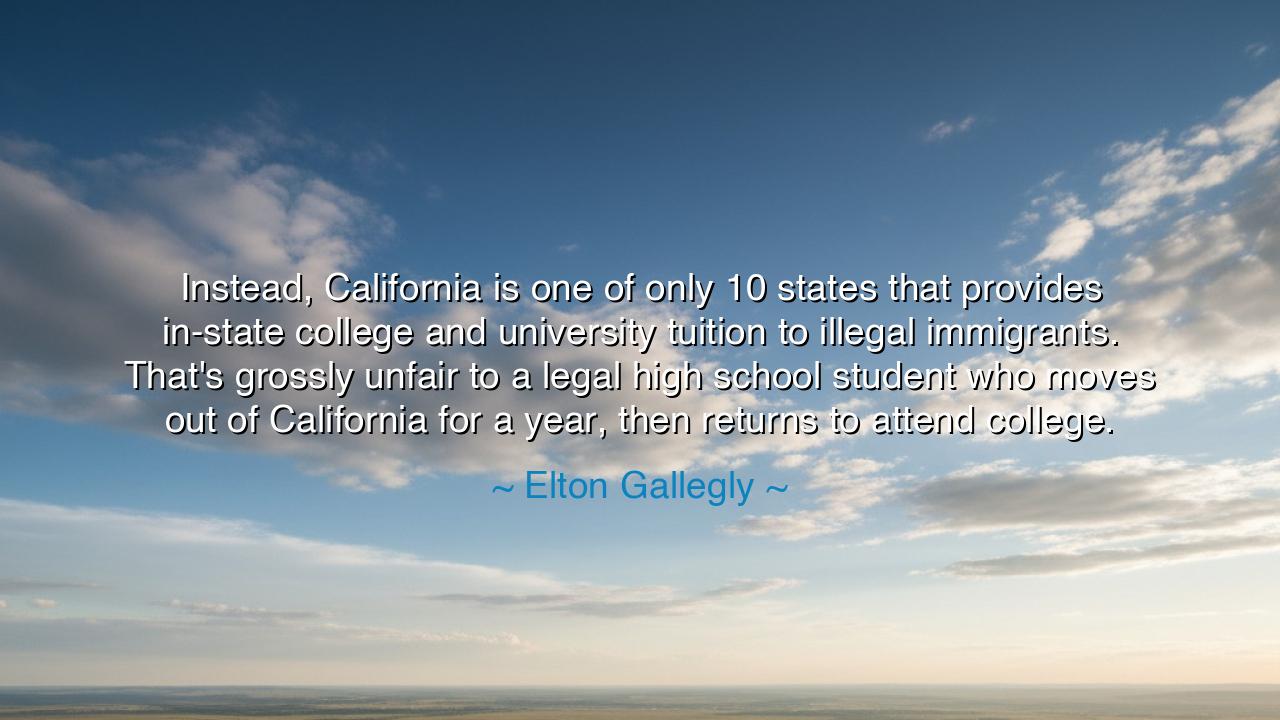
Instead, California is one of only 10 states that provides
Instead, California is one of only 10 states that provides in-state college and university tuition to illegal immigrants. That's grossly unfair to a legal high school student who moves out of California for a year, then returns to attend college.






When Elton Gallegly declared, “Instead, California is one of only 10 states that provides in-state college and university tuition to illegal immigrants. That's grossly unfair to a legal high school student who moves out of California for a year, then returns to attend college,” he spoke from the crucible of a long and fiery debate — a debate not only about borders and policies, but about the very meaning of fairness, law, and belonging. His words reveal the eternal tension between compassion and justice, between the heart’s mercy and the law’s discipline. To the ancient ear, this conflict would sound familiar, for it echoes through every age where a nation has struggled to reconcile the demands of its laws with the longings of its humanity.
The origin of this quote lies in the early years of the twenty-first century, when questions of immigration and education swirled fiercely in the public square. California, a land shaped by migration and diversity, had chosen to extend in-state tuition to undocumented students — young men and women who had grown up within its borders, studied in its schools, and dreamed in its language, yet lacked the legal papers that conferred citizenship. To Gallegly, a congressman from California and a defender of legal order, this policy represented an injustice — a betrayal of those who followed the law. His words were not only a critique of policy but a lament for a principle: that legal obedience should not be punished, and that the benefits of citizenship should not be diluted by sentiment alone.
Yet, beneath his argument lies a broader moral question — one as old as civilization itself. How should a just society treat those who live within its borders but stand outside its laws? In the time of the Romans, when new peoples sought the rights of citizenship, the Senate was divided between those who would open the gates and those who would guard them. The lex Julia, which granted citizenship to some Italian allies, was born from such tension. Some saw it as betrayal; others saw it as the dawn of unity. In every age, the lawgiver must walk the razor’s edge between inclusion and integrity, between extending mercy and preserving fairness.
Gallegly’s lament for the “legal high school student” who leaves the state for a year speaks to a deep sense of moral balance — the belief that justice must weigh equally upon all. Why, he asks, should one who obeys the law bear greater burdens than one who defies it? To him, the law is not a mere instrument of convenience, but a sacred covenant — the bond that ensures trust between the citizen and the state. Without such order, the noble virtues of effort and obedience lose their meaning. In his eyes, to favor the undocumented over the lawful is not compassion but confusion — the blurring of the moral line that keeps society upright.
Yet others have seen in his words not justice, but sorrow — for they reveal the pain of a nation divided between empathy and law, each noble in its own way. The undocumented student who studies diligently, who dreams of serving the only home they have ever known, stands not as an enemy of the law but as a child of circumstance. In the eyes of compassion, they, too, deserve a place at the table of opportunity. And thus the dilemma deepens: if justice demands equality, does not mercy demand understanding? If the law must punish, should it not also redeem? Such questions, unresolved, lie at the heart of every great society’s moral journey.
History teaches us that nations endure not by choosing sides, but by seeking harmony between their laws and their conscience. In ancient Athens, Pericles once declared that the greatness of a city lies in its ability to balance freedom with order, and compassion with discipline. A state that closes its heart becomes brittle; a state that forgets its laws becomes blind. The challenge of Gallegly’s statement, therefore, is not merely political — it is philosophical. It forces every listener to ask: what is fairness, and to whom do we owe it?
Let the reader take from this not anger, but wisdom. For both the citizen and the stranger, both the enforcer of law and the advocate of mercy, serve vital roles in the grand design of justice. The path forward lies neither in rigid exclusion nor reckless inclusion, but in the pursuit of a higher harmony — where the law protects, yet does not harden; where mercy uplifts, yet does not blind.
Thus, the teaching of Gallegly’s words endures: law without compassion becomes tyranny, but compassion without law becomes chaos. The wise nation must hold both in sacred balance. Let every generation remember this — that fairness is not found in the clamor of sides, but in the quiet strength of understanding. And only when justice and mercy walk hand in hand can a people truly call themselves free.






AAdministratorAdministrator
Welcome, honored guests. Please leave a comment, we will respond soon